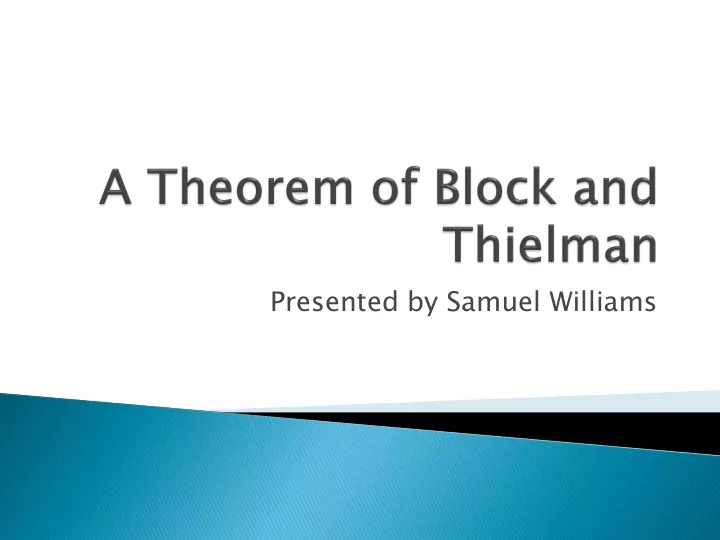

Presented by Samuel Williams
Certain polynomials, with coefficients in the real or complex numbers, commute under composition Two polynomials, f(x) and g(x), commute under composition if (f ∙ g)(x) = (g ∙ f)(x) or f(g(x)) = g(f(x))
A polynomial f(x) is similar to a polynomial, g(x), if there exists a degree 1 polynomial λ (x) such that g(x) = ( λ⁻¹ ∙ f ∙ λ )(x) Similarity is an equivalence relation
Take two polynomials, f(x) and g(x) Assume f(x) commutes with g(x) Then ( λ⁻¹ ∙ f ∙ λ )(x) commutes with ( λ⁻¹ ∙ g ∙ λ )(x) This is our first helper theorem
There is, at most, one polynomial of any degree (greater than 1) that commutes with a given degree 2 polynomial One may consult Rivlin for further information This is our second helper theorem
A chain is a sequence of polynomials which ◦ contains one polynomial of each positive degree ◦ such that every polynomial commutes with any polynomial in the chain
Power monomials ◦ Given by {x n , n = 1, 2, 3, ...} Chebyshev polynomials ◦ Given by {T n (x), n = 1, 2, 3, ...} T n (x) = cos n (cos -1 (x)) T n (x) = 2xT n-1 (x) - T n-2 (x)
We can construct new chains from the two major chains ( λ⁻¹ ∙ ( x n )∙ λ )(x) is a chain ( λ⁻¹ ∙ ( T n )∙ λ )(x) is also a chain
A polynomial f(x) is even if and only if f(-x)=f(x) ◦ All odd degree coefficients in an even polynomial are 0 A polynomial f(x) is odd if and only if f(-x)=-f(x) ◦ All even degree coefficients in an odd polynomial are 0
All chains are similar to either the power monomials or the Chebyshev polynomials The power monomials and the Chebyshev polynomials are the only two chains, up to similarity
Let {p n (x), n = 1, 2, 3, ...} be a chain p 2 (x) = a 2 x 2 +a 1 x+a 0 Let {q j (x), j = 1, 2, 3, ...} be a chain similar to {p n (x)} via q 2 (x) = x 2 +c We know that q 2 (x) commutes with q 3 (x)
So, by definition (*) We can see that Which means that So
q 3 (x) is a degree 3 polynomial ◦ The degree 3 coefficient cannot be 0 ◦ Thus, q 3 (x) cannot be even ◦ So q 3 (-x) = - q 3 (x), and q 3 (x) is odd This implies that q 3 (x) = b 3 x 3 +b 1 x Because q 2 (x) is monic, q 3 (x) is also monic b 3 =1
We substitute q 3 (x) back into equation (*)
So
Thus, c =-2 or c =0
Then q 2 (x) = x 2 +c = x 2 q 2 (x) is a power monomial ◦ The only polynomials that commute with x 2 are the power monomials by the second helper theorem {q j (x), j = 1, 2, 3, ...} must be the power monomials So {p n (x), n = 1, 2, 3, ...} is similar to the power monomials
Then q 2 (x) = x 2 +c = x 2 -2 Consider Then
We know that is a chain from our first helper theorem We know that this chain is actually the Chebyshev polynomials by our second helper theorem Thus, {p n (x), n = 1, 2, 3, ...} is similar to the Chebyshev polynomials, as similarity is transitive
Thank you!
Recommend
More recommend